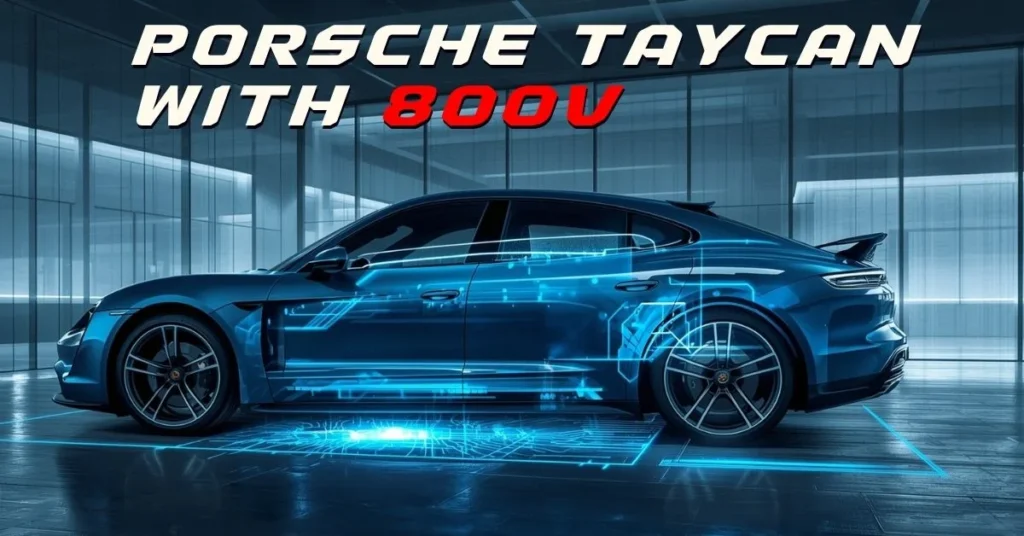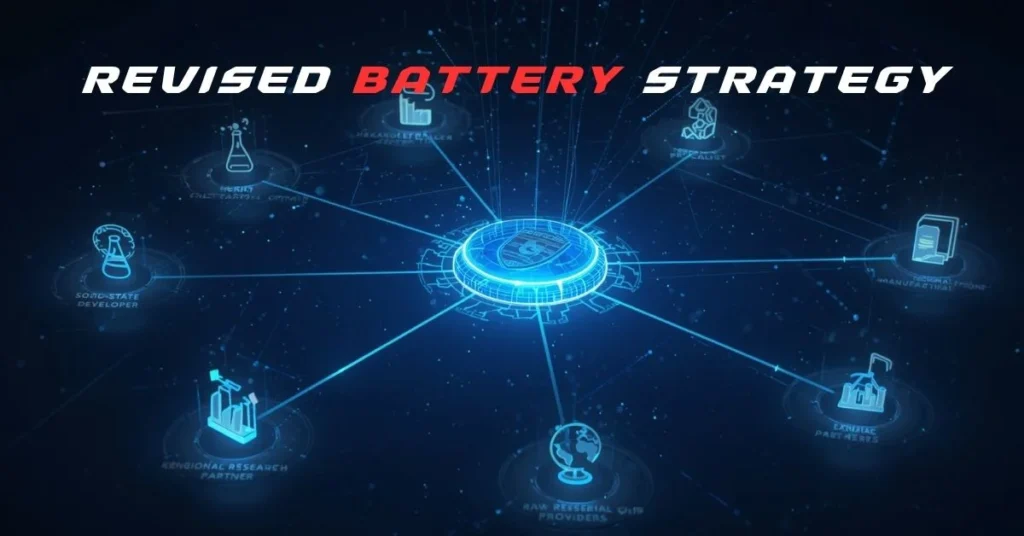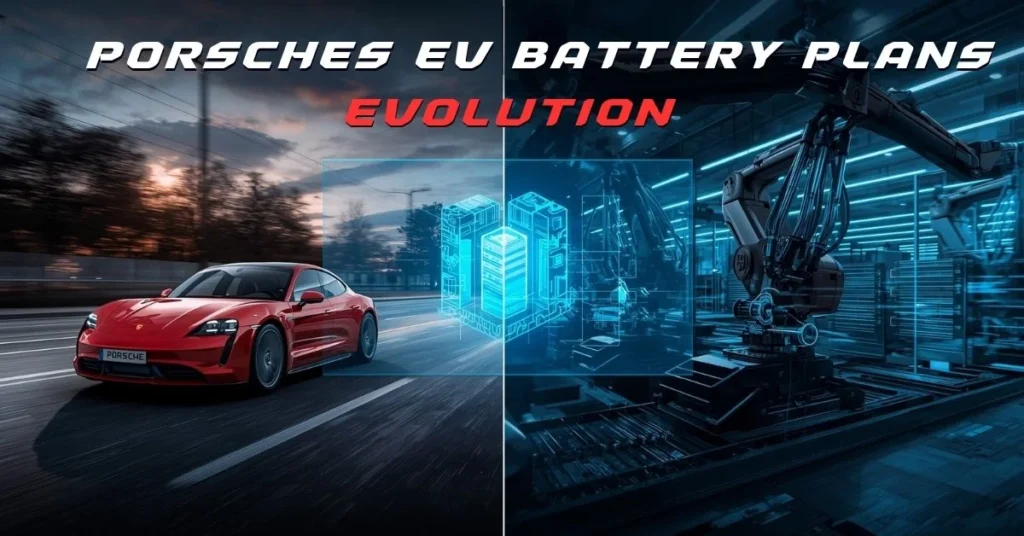Porsche is making a major shift in its electric vehicle strategy with sweeping changes to how it approaches battery technology. The iconic German luxury carmaker has announced a complete overhaul of its EV battery plans, going far beyond simple tweaks and upgrades. Instead, Porsche is diving deep into cutting-edge battery tech, reworking its supply chains to be smarter and more efficient, and doubling down on its promise to deliver the exhilarating performance the brand is famous for just with electric power instead of gasoline.
As the electric car market explodes and battery innovation becomes the make-or-break factor for success, Porsche’s bold new direction signals its determination to dominate the premium EV space. For enthusiasts and investors alike, this isn’t just an update—it’s Porsche planting its flag in the electric future while staying true to the high-performance DNA that made it a legend.

Understanding Porsche’s Original EV Battery Strategy
Before examining the recent changes, it’s essential to understand Porsche’s initial approach to EV battery development. The company had previously committed to various partnerships and in-house development initiatives aimed at securing battery technology that would support its ambitious electrification goals. Porsche’s original strategy involved collaboration with multiple suppliers and investment in proprietary battery cell manufacturing capabilities. The automaker’s flagship electric vehicle, the Taycan, demonstrated Porsche’s capability to deliver high-performance EVs with distinctive 800-volt architecture. This technology enabled faster charging times and superior performance characteristics compared to conventional 400-volt systems used by many competitors. However, as market conditions evolved and new technologies emerged, Porsche recognized the need to reassess its long-term battery strategy.
Porsche’s commitment to electrification builds on decades of engineering excellence seen across its entire lineup, from traditional powertrains like the Mercedes-Benz Engines used in some collaborative projects to cutting-edge electric drivetrains. Performance enthusiasts looking to understand the evolution of high-performance powertrains can explore resources on classic engines like the Toyota 2JZ for comparison of different engineering philosophies.
Key Factors Driving the Porsche EV Battery Plans Change
Several critical factors have influenced Porsche’s decision to modify its battery development approach:
Market Dynamics and Technology Evolution
- Rapid advancement in solid-state battery technology
- Increasing availability of high-performance lithium-ion cells from specialized suppliers
- Shifting cost structures in battery manufacturing
- Enhanced battery energy density from third-party manufacturers
Supply Chain Considerations
- Global semiconductor shortages highlighting supply chain vulnerabilities
- Geopolitical tensions affecting raw material sourcing
- The strategic importance of diversifying battery suppliers
- Regulatory requirements in different markets
Financial and Operational Efficiency
- Capital expenditure optimization
- Risk mitigation through strategic partnerships
- Focus on core competencies in vehicle engineering and integration
- Flexibility to adopt emerging technologies without heavy sunk costs
Details of the Revised Battery Strategy
The Porsche EV battery plans change encompasses several key modifications to the company’s approach:
Partnership Restructuring
Porsche has shifted toward strengthening strategic partnerships with established battery manufacturers rather than pursuing extensive in-house cell production. This approach allows the automaker to leverage expertise from specialized battery companies while maintaining focus on vehicle integration and performance optimization.
Technology Diversification
Rather than committing exclusively to one battery technology, Porsche’s revised strategy embraces multiple battery chemistries and architectures. This flexibility positions the company to adopt breakthrough technologies, including solid-state batteries, as they become commercially viable.
Regional Manufacturing Considerations
The changes also reflect a more nuanced approach to regional battery sourcing, ensuring compliance with local content requirements and reducing transportation costs and carbon footprint associated with battery logistics.
Comparison: Original vs. Revised Battery Strategy
| Aspect | Original Strategy | Revised Strategy |
| Manufacturing Approach | Heavy investment in proprietary cell production | Strategic partnerships with specialized manufacturers |
| Technology Focus | Primarily 800V lithium-ion technology | Multi-chemistry approach including solid-state readiness |
| Supply Chain | Concentrated supplier relationships | Diversified global supplier network |
| Capital Investment | High upfront manufacturing infrastructure costs | Reduced capital expenditure, flexible scaling |
| Technology Adoption | Longer commitment cycles to specific technologies | Agile adoption of emerging battery innovations |
| Risk Profile | Higher operational risk, greater control | Distributed risk through partnerships |
Impact on Porsche’s Electric Vehicle Lineup
The Porsche EV battery plans change will have far-reaching implications for the company’s expanding electric vehicle portfolio:
Taycan Evolution: Future iterations of the Taycan will benefit from improved battery technology, potentially offering enhanced range, faster charging, and reduced weight without requiring Porsche to build entirely new manufacturing infrastructure.
Macan Electric: The upcoming electric Macan SUV will leverage these new partnerships, ensuring competitive battery performance while maintaining Porsche’s characteristic driving dynamics.
Future Models: Planned electric versions of iconic models like the Cayenne and potentially the 718 sports cars will benefit from the flexibility this revised strategy provides.

Benefits of the Strategic Shift
Porsche’s decision to change its EV battery plans offers several advantages:
- Accelerated Innovation Access: By partnering with leading battery manufacturers, Porsche gains immediate access to cutting-edge developments without extensive R&D timelines
- Financial Flexibility: Reduced capital expenditure on manufacturing infrastructure allows investment in other critical areas such as software development and autonomous driving technology
- Risk Mitigation: Diversified supply chains protect against disruptions from any single supplier or geographic region
- Scalability: The ability to scale production up or down based on demand without being constrained by in-house manufacturing capacity
- Technology Agnosticism: Freedom to adopt the best available battery technology as the market evolves, including solid-state batteries when they mature
- Faster Time to Market: Leveraging existing manufacturing expertise from partners can accelerate new model development cycles
Porsche’s focus on core competencies in vehicle dynamics and integration mirrors how specialized component manufacturers excel in their domains. Just as transmission specialists produce exceptional gearboxes like the Ford 6R80 transmission or the GM 8L90 transmission, battery manufacturers bring focused expertise that allows Porsche to concentrate on what it does best: creating exhilarating driving experiences.
Industry Implications and Competitive Landscape
Porsche’s strategic pivot reflects broader trends in the automotive industry. Other manufacturers are similarly reassessing their battery strategies, balancing vertical integration against partnership models. This Porsche EV battery plans change may influence how other premium automakers approach battery sourcing and development.
The decision also highlights the maturing battery supply ecosystem, where specialized manufacturers can provide high-quality cells that meet the stringent performance requirements of premium EVs. This development contrasts with earlier industry concerns about battery supply constraints and quality consistency.
Challenges and Considerations
While the revised strategy offers numerous benefits, it also presents certain challenges:
- Differentiation: Porsche must ensure that relying on external suppliers doesn’t diminish the unique characteristics that distinguish its vehicles from competitors using similar battery technologies.
- Supply Security: Despite diversification, the company remains dependent on external partners for critical components, requiring robust supplier relationships and contracts.
- Technology Control: Reduced in-house development may limit Porsche’s ability to create proprietary battery innovations that could provide competitive advantages.
- Transition Management: Shifting from the original strategy to the new approach requires careful management to avoid disruptions in current and planned vehicle production.
Maintaining differentiation with common components challenges all automakers. Similar concerns arose when multiple brands adopted standardized transmissions like the GM 4L60E transmission or the Ford AOD transmission, yet manufacturers successfully maintained unique brand characteristics through tuning, integration, and vehicle dynamics. Porsche must apply similar differentiation strategies with battery technology.
Future Outlook: Solid-State and Beyond
A critical component of the Porsche EV battery plans change involves positioning for next-generation technologies. Solid-state batteries promise higher energy density, faster charging, and improved safety compared to current lithium-ion technology. Porsche’s revised strategy provides flexibility to integrate these batteries once they achieve commercial viability, without being locked into obsolete manufacturing infrastructure. The automaker has maintained investments in research partnerships focused on solid-state technology while avoiding premature commitment to large-scale production facilities. This balanced approach exemplifies the strategic thinking behind the battery plan modifications.
Conclusion
Porsche’s new EV battery strategy marks a major step forward in its move toward electrification. Instead of handling everything in-house, Porsche is now focusing on partnerships and using a wider range of battery technologies. This approach helps the brand stay flexible, reduce costs, and speed up innovation while keeping its well-known performance standards. By working with experts and preparing for next-generation tech like solid-state batteries, Porsche aims to lead the premium electric car market. The company’s focus on agility, efficiency, and smart technology ensures it stays ahead in the world of high-performance EVs. In short, Porsche’s new battery plan isn’t just a technical change it’s a smart, future-ready strategy for long-term success in the electric era.
Frequently Asked Questions
-
Will the Porsche EV battery plans change affect current Taycan owners?
No, current Taycan models are not affected by these strategic changes. The modifications primarily impact future production planning and next-generation vehicle development.
-
Does this mean Porsche is abandoning its 800-volt architecture?
Not at all. The 800-volt system remains a cornerstone of Porsche’s EV technology. The changes relate to how batteries are sourced and manufactured, not the fundamental electrical architecture.
-
When will vehicles reflecting these new battery plans reach the market?
The transition will be gradual, with upcoming models and refreshes of existing EVs incorporating batteries sourced through the new partnership structure over the next several years.
-
How does this affect Porsche’s sustainability goals?
Porsche remains committed to sustainability. The revised strategy includes provisions for ensuring ethical sourcing and environmental responsibility throughout the battery supply chain.
-
Will battery performance improve due to these changes?
Yes, access to specialized battery manufacturers’ latest technologies should enable continuous improvements in energy density, charging speed, and overall performance across Porsche’s EV lineup.



